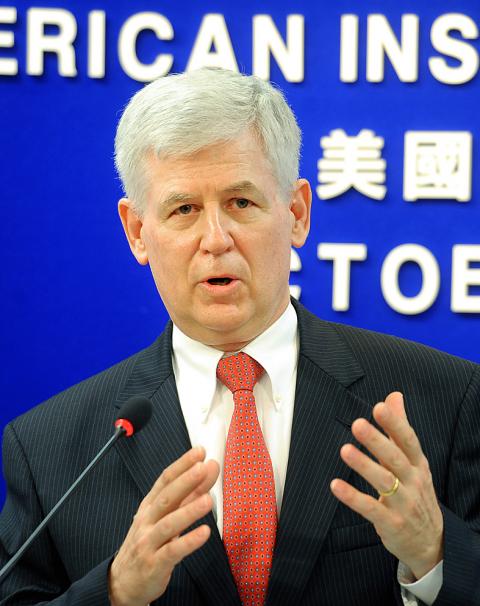|
Taiwan an important
part of US¡¦ Asia strategy: AIT
KEY PLAYER: The new head of the American
Institute in Taiwan said he was dedicated to furthering bilateral ties and that
Taiwan was an important security partner
By Shih Hsiu-chuan / Staff reporter

American Institute in Taiwan
Director Christopher Marut speaks during a press conference in Taipei yesterday.
Photo: Fang Pin-chao, Taipei Times
The US views the role of Taiwan in
supporting US President Barack Obama¡¦s strategy to strengthen its presence in
the Asia-Pacific region positively, American Institute in Taiwan (AIT) Director
Christopher Marut said yesterday.
¡§Certainly, as a major component of the so-called pivot or rebalance, the US is
looking to expand trade and cooperation as part of its overall focus on Asia,
and Taiwan is an important economic and security partner in the region,¡¨ Marut
said at a press conference in response to media inquiries on what the US
redirecting its military focus to Asia means for Taiwan and how the plan is
being carried out through the AIT¡¦s work.
The plan was unveiled earlier this year, prompting discussion on how it would
reshape the trilateral relationship between Washington, Beijing and Taipei.
At a press conference scheduled to introduce Marut, who assumed the position of
AIT director three weeks ago, he highlighted the areas of economic and security
cooperation between the US and Taiwan.
On the economic front, the AIT is to work to advance US trade relations with
Taiwan, by both expanding US exports to meet the Obama administration¡¦s goal of
doubling exports by 2015, as well as encouraging Taiwanese investment and
manufacturing to come to the US, he said.
Following Taiwan¡¦s decision to relax restrictions on imports of US beef
containing residues of the leanness-enhancing feed additive ractopamine in July,
the US has decided to send an interagency team to Taipei later this month to
discuss resuming talks under the Trade and Investment Framework Agreement (TIFA)
platform.
At the question-and-answer session, Marut said the US looks forward to moving
TIFA talks forward, but ¡§no decision has been made yet on when to resume those
talks.¡¨
The talks started in 1994, but have been suspended by the US since 2007 in
response to Taiwan banning imports of US beef over fears of mad cow disease.
Taipei¡¦s policy of resticting US beef containing ractopamine further prolonged
the talks¡¦ hiatus, until they were scheduled to resume late that month.
Responding to a question on which issue would be the largest obstacle to him to
boosting US-Taiwan ties in the next few years, Marut said: ¡§Certainly, on the
trade side, we have got a lot of work to do. TIFA talks have not been held since
2007 ¡K I think that rebuilding of trust has to take place between the two
sides.¡¨
On questions relating to Taiwan¡¦s accession to the US-led emerging Trans-Pacific
Partnership (TPP), he said discussion of Taiwan¡¦s possible future inclusion in
the TPP is ¡§premature.¡¨
¡§From the US¡¦ perspective, the current priority should be for Taiwan to rebuild
confidence in our bilateral trade relationship,¡¨ Marut said.
When asked whether the US will continue to push Taiwan to allow pork containing
ractopamine residues, Marut said: ¡§The US consistently urges Taiwan to ensure
that its food safety measures are based on science and consistent with
international standards.¡¨
Marut said the ractopamine residue safety standards established by international
food safety body the Codex Alimentarius Commission in early July applies to both
beef and pork products.
With regard to security cooperation between the US and Taiwan, which he
described as ¡§one of the strongest elements¡¨ of the overall relationship, Marut
said that he would continue to support the efforts which have contributed to
regional stability.
Marut was also asked questions regarding recent actions taken by Taiwan to
assert sovereignty over the Diaoyutai Islands (³¨³½¥x) ¡X disputed by Japan and
China ¡X but appeared reticent about offering his view on the matter.
¡§The East China Sea issue is one that the claimants must resolve among
themselves. The US encourages them to do so in a peaceful manner. We want all
parties involved to work this out through dialogue,¡¨ he said.
|
![]()
![]()
![]()